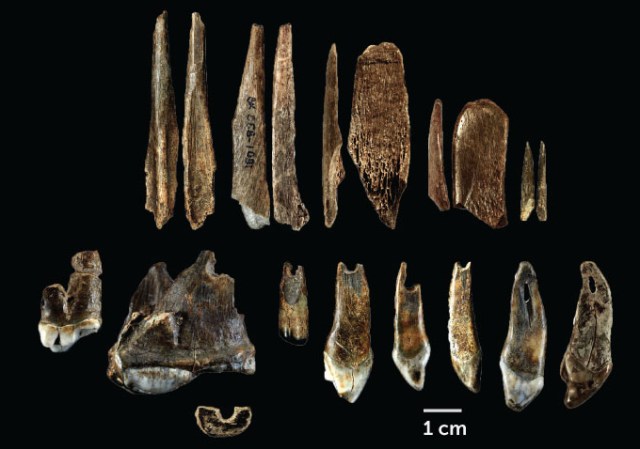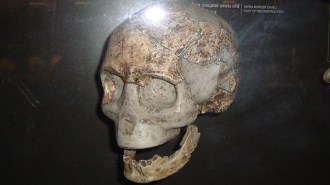The earliest known humans in Europe may have been found in a Bulgarian cave
Newfound Homo sapiens remains date to between about 46,000 and 44,000 years ago, researchers say

Excavations in Bulgaria’s Bacho Kiro Cave (shown) unearthed the oldest directly dated remains of Homo sapiens in what’s now Europe, researchers say.
Monodon/iStock/Getty Images Plus
By Bruce Bower
- More than 2 years ago
Read another version of this article at Science News Explores
A tooth and six bone fragments found in a Bulgarian cave are the oldest directly dated remains of Homo sapiens in Europe, scientists say.
Until now, most of the earliest fossils of humans on the continent ranged in age from around 45,000 to 41,500 years old. But those ages are based on dates for sediment and artifacts associated with the fossils, not the fossils themselves. The newfound remains date to between roughly 46,000 and 44,000 years ago, researchers report May 11 in Nature.
A previous report of the earliest human fossil in Europe centered on a skull fragment from what’s now Greece (SN: 7/10/19). That fossil may date to at least 210,000 years ago, which would make it the oldest by far, but the dating and species identification of that find are controversial.
The new discoveries at Bulgaria’s Bacho Kiro Cave have added evidence for a scenario in which African H. sapiens reached the Middle East approximately 50,000 years ago (SN: 1/28/15) and then rapidly dispersed into Europe (SN: 11/2/11) and Central Asia (SN: 10/22/14), the scientists conclude.
Except for the tooth, the new H. sapiens fossils were too fragmentary to identify by their appearance. But researchers could extract proteins from the fossils. An analysis of how the proteins’ building blocks were arranged, which can distinguish between various animal species, pegged them as human, say paleoanthropologist Jean-Jacques Hublin of the Max Planck Institute for Evolutionary Anthropology in Leipzig, Germany and colleagues. Mitochondrial DNA, typically inherited from the mother, obtained from six of the seven H. sapiens fossils also identified the fossils as human.
A second study by many of the same researchers and led by Max Planck archaeologist Helen Fewlass reports estimated ages of the Bacho Kiro finds. Radiocarbon dates of the fossils and age calculations for recovered mitochondrial DNA, based on comparisons to ancient and present-day people’s mitochondrial DNA, consistently put the finds at between around 46,000 and 44,000 years old, the researchers report May 11 in Nature Ecology & Evolution.

What’s more, stone artifacts and personal ornaments found with the human fossils are the earliest examples of a shift in tool and ornament making from what’s known as the Initial Upper Paleolithic culture, Hublin and colleagues say. Along with several earlier European excavations, the new finds indicate that Initial Upper Paleolithic tools were made for only a few thousand years before being replaced by related implements from the Aurignacian culture, which dates to between 43,000 and 33,000 years ago (SN: 3/23/15).
The newfound stone tools and pendants made from cave bear teeth appear to have inspired similar objects made a few thousand years later by western European Neandertals, Hublin says, suggesting that ancient humans in Bulgaria mingled with native Neandertals. “The Bacho Kiro cave provides evidence that pioneer groups of Homo sapiens brought new behaviors into Europe and interacted with local Neandertals,” Hublin says.
Although that’s possible, Neandertals made jewelry out of eagle talons around 130,000 years ago (SN: 3/20/15). That’s long before when H. sapiens are generally thought to have first reached Europe, and thus Neandertals may not have been influenced by the newcomers’ ornaments, says paleoanthropologist Chris Stringer of the Natural History Museum in London, who did not participate in the new studies.
Human groups that brought Initial Upper Paleolithic toolmaking to Europe may have been too small to stay or survive for long when confronted with larger numbers of Neandertals and frequent climate fluctuations at the time, Stringer suspects. For as yet unclear reasons, it was the Aurignacian toolmakers who first took root in Europe and witnessed “a physical but not genetic end” to Neandertals, some of whose DNA survived in H. sapiens as a result of previous interbreeding, he says (SN: 5/11/15).
Bacho Kiro discoveries fill in the picture of where H. sapiens were located in southeastern Europe during a period already known to have included interbreeding between humans and Neandertals, says archaeologist Paul Pettitt of Durham University in England, who was not part of Hublin’s team. Like Stringer, Pettitt suspects ancient humans’ stay at Bacho Kiro “was brief and ultimately a failure.”
More than 11,000 animal bone fragments also unearthed at Bacho Kiro come from 23 species, including bison, red deer, cave bears and goats. Some bones displayed stone tool marks made during butchery and skinning of animals, as well as intentional breaks where marrow was removed, the researchers say.






